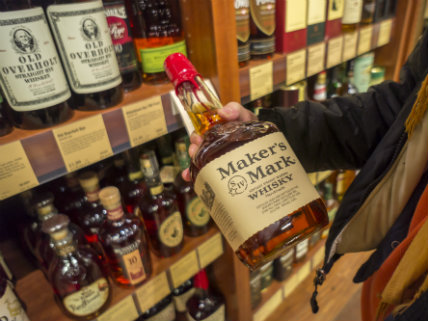Florida Gov. Rick Scott Won't Let You Buy Booze in Grocery Stores
Scott claims the anti-consumer veto is about helping small businesses. It's not. It just maintains government-granted privilege for a handful of businesses.

Florida Gov. Rick Scott vetoed a bill that would have allowed grocery stores, gas stations, and other retailers to sell liquor alongside the beer and wine they already offer. The proposal to tear down Florida's so-called "liquor wall" had cleared the state legislature despite opposition from groups that benefit from the mandatory separation of liquor sales, including the liquor stores themselves and a major grocery chain that runs a series of independent liquor stores.
The Miami Herald reports that the "winners" from Scott's veto include independent liquor-store owners, ABC Fine Wine & Spirits and Publix Super Markets," all of which opposed the bill as it was making its way through the state legislature. Rory Eggers, president of the Florida Independent Spirits Association, which represents the privately-owned, spirits-only retailers across the state, said in a statement that the group delivered more than 3,000 petitions to Scott urging him to veto the bill.
Like a good Republican, Scott claimed the veto was about looking out for the best interests of the business community in Florida—even though the businesses in question only exist because of a protectionist scheme that's been maintained by the state government since the end of Prohibition.
"I have heard concerns as to how this bill could affect many small businesses across Florida," Scott wrote in his veto message. "I was a small business owner and many locally owned businesses have told me how this bill will impact their families and their ability to create jobs."
Scott's logic doesn't make much sense, though. By his reasoning, Florida should mandate that each and every product sold in grocery stores or Wal-Marts have to be sold by a separate retailer. There should be one store for vegetables, another store for paper goods, a separate one for dairy products, and so on. Imagine how many small businesses that would create!
That's nonsense, of course, just like the governor's argument for maintaining Florida's protectionism for liquor stores. Scott can dress it up however he wants, but this veto is very much an anti-consumer move. Retailers that want to make shopping more convenient should be allowed to do that.
The claim that he's protecting small businesses is similarly questionable. Under the current law, large grocery stores like Publix benefit from being able to house separate liquor stores within their footprint, while smaller grocery stores that can't afford to do that are not allowed to sell liquor.
Most of all, though, this is about maintaining a special government-granted privilege that benefits some businesses at the expense of others.
It's another illustration of the relationship between government and booze that I highlighted earlier this month in a feature about the latest efforts to reform Pennsylvania's liquor laws. The only difference is that, in Pennsylvania, the liquor stores are government-run entities and the employees are government workers (and public sector union members), so it's Democrats who typically argue against doing away with the stand-alone liquor stores. When they do, they use pretty much the same reasoning that Scott employed this week in Florida, claiming that allowing other retailers to sell liquor would hurt the workers whose jobs only exist because of government edict.
In Florida, the liquor stores are privately run (which is better, I'll grant), so it's Republicans like Scott defending them as small businesses in need of government protection.


Show Comments (20)